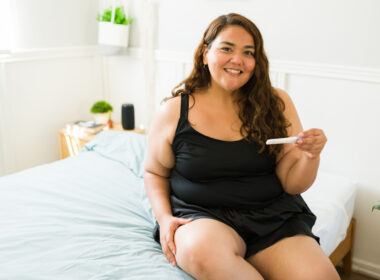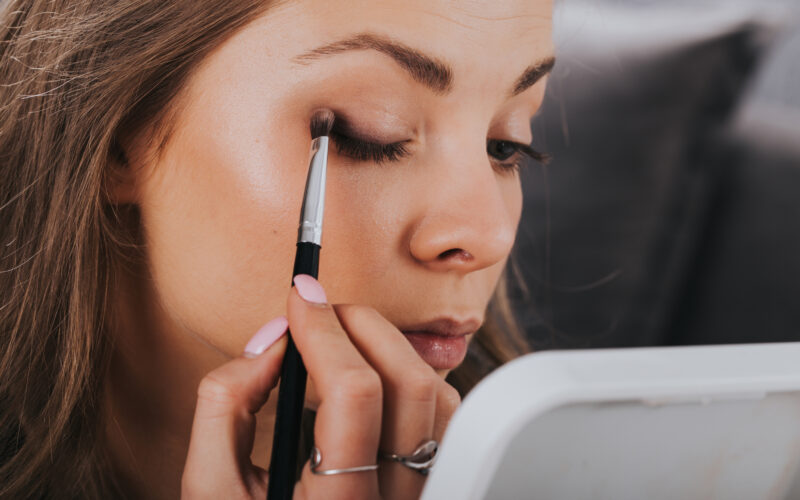As I was scrolling through Instagram one day, I came across a click-bait post shared by a friend in her stories. The title read, “New study finds skincare ingredients are linked to breast cancer.”
As a former breast cancer and immunology researcher, the post—which linked to a научное исследование—naturally caught my eye [1]. You’re no doubt already familiar with the consumer push for “clean beauty” products, and a growing awareness that the ingredients in our cosmetics, skincare, and body care products might actually matter. Scientists, motivated by increased pressure from consumers and skincare developers alike, have also tried to understand how ingredients may affect our health.
But how worried do you need to be about your skin care products and breast cancer risk?
Researchers explored whether parabens and phthalates affect cancer risk
This particular study was conducted in collaboration with Breast Cancer Over Time, a nonprofit group funding community-based research. Two of the study authors are involved with this group, one is a breast cancer survivor and the other is a public health scientist. The collaboration allowed the research investigators to recruit study participants from a pool of women who are passionate about breast cancer research and risk reduction.
The investigators recruited 41 female participants who regularly used skincare products that contained parabens or phthalates. Excitingly, they had 100% compliance, meaning all of the women followed all the requirements of the study, which is pretty rare!.
The 41 women were randomized into two groups. One group–the control group–kept using their same skincare, body care, and makeup products as usual. The other group was given skincare, body care, and makeup products free from paraben or phthalates.
Parabens and phthalates: two skincare ingredients that might act like estrogen in the body
Before we dive into the study results, we need to define what parabens and phthalates are, how they’re related to estrogen, and why all this matters for breast cancer.
Parabens and estrogen
According to the U.S. Food and Drug Administration (FDA), parabens are a commonly used preservative in personal care products and cosmetics. Preservatives are important ingredients because they prevent unwanted bacteria and/or mold growth in your products. Some examples of parabens you might see on a personal care item’s ingredients list include methylparaben, propylparaben, butylparaben, and ethylparaben.
Parabens have the potential to act like the hormone estrogen in the body. Estrogen, along with the hormone progesterone, plays a key role in the female menstrual cycle. Estrogen is responsible for the growth of the uterine lining and formation of peak-type cervical mucus, both of which are necessary for conception to occur.
Управление по контролю за продуктами и лекарствами maintains that parabens have much lower estrogenic activity compared to the natural hormone, and have not been shown to be harmful. So far, studies in humans have not found strong evidence that parabens cause breast cancer, as explained by the American Cancer Society, здесь. Some organizations and research groups, however, like the Environmental Working Group (EWG, a non-profit activist group) claim parabens have potentially harmful endocrine-disrupting activity. They assert that these ingredients may be doing more in our bodies than just preventing bacterial growth on or in our skincare products.
Phthalates and estrogen
Фталаты are a class of chemicals used in a broad variety of products including plastics, personal care products, cosmetics, and fragrances. They have functions that make plastics more durable, act as solvents to help ingredients dissolve properly in a formulation, and help ingredients “stick” on your skin–as in the case of fragrance.
The FDA provides maximum amounts of phthalates that can be used in consumer products, and according to the available data, also considers these ingredients safe. However, like parabens, phthalates are известные эндокринные разрушители. Phthalate exposure may contribute to обильные месячные, irregular cycles, abnormal cervical mucus patterns, endometriosis, infertility, and even cancer. Phthalate exposure can be particularly damaging during беременность, leading to increased risk of преждевременные роды. Phthalates have also been shown to have endocrine-disrupting effects in males, lowering testosterone levels and even disrupting sperm quality, affecting male fertility.
The hormone estrogen is crucial for female sexual maturation, including the development of breast tissue. The cells in your breasts have receptors that bind to the hormone estrogen. That’s why when your body has an increase in estrogen during puberty, your breasts grow and develop.
Some cells in your breasts that could become cancerous also have these estrogen receptors. If these cells become cancerous, we say you have estrogen-receptor positive (ER+) рак груди. This means estrogen can “turn on” cancer cells that have receptors for the estrogen hormone, thus acting as a signal for the cancer cells to divide.
While parabens aren’t estrogens, they can mimic the hormone estrogen in your body. Thus, they’re referred to as ксеноэстрогены. Xeno comes from the Greek word meaning “foreign,” so a xenoestrogen is any external source of estrogen activity in your body. As the thinking goes, products containing estrogen-like chemicals, like parabens, could exacerbate this estrogenic activity and potentially contribute to breast cancer.
Did the study find that parabens or phthalates affect breast cancer risk?
Now, let’s get back to our research study. The researchers were interested in what, if any, role parabens and phthalates might have in breast cancer development. There were two main questions the study aimed to answer:
- Are parabens and phthalates from skincare products detectable in the body?
- Do these parabens and phthalates have any affect on breast tissue and cancer development?
The ingredients in our products are detectable in our urine
To answer the first question, scientists assessed the urine of study participants for paraben and phthalate levels. Then, they wanted to know if swapping out the participant’s personal care products measurably reduced the levels of parabens and phthalates found in the participants’ urine.
First, the scientists сделал detect several different parabens and phthalates in the urine of participants. They also saw significantly lower levels of several parabens and one phthalate in the study participants 28 days after switching up the participants’ product regimen to paraben- and phthalate-free products.
First, the scientists сделал detect several different parabens and phthalates in the urine of participants. They also saw significantly lower levels of several parabens and one phthalate in the study participants 28 days after switching up the participants’ product regimen to paraben- and phthalate-free products.
Parabens and phthalates affected some gene expression
For the “meat” of their study, the investigators assessed whether paraben- and phthalate-containing products had any effect on cancer-associated genes. These are genes that tend to be turned on (have higher expression) or turned off (have lower expression) in breast cancer cells or tumors.
Some genes are protective against cancer, and are turned с сайта in cancer cells so the cancer can spread. Other genes are helpful for the cancer to spread aggressively–these genes can be turned на, or upregulated, in cancer cells.
Of the 41 total study participants (все of whom, prior to the beginning of the study, used personal care products with parabens and phthalates), the researchers obtained samples of breast tissue cells from 36 women before and after they switched their personal care products. Twenty of these samples were acceptable for further analysis.
28 days to change gene expression?
From these 20 samples, the researchers looked at 26 genes that are relevant to cancer. They found 19 of these genes changed to “normal” levels in the women who switched their care products to ones that were paraben- and phthalate free. Interestingly, it only took 28 days to “reset” the gene expression with paraben- and phthalate-free products.
From these 20 samples, the researchers looked at 26 genes that are relevant to cancer. They found 19 of these genes changed to “normal” levels in the women who switched their care products to ones that were paraben- and phthalate free. Interestingly, it only took 28 days to “reset” the gene expression with paraben- and phthalate-free products.
Finally, the researchers wanted to see if the paraben and phthalate metabolites could have an effect on biological processes, which would reflect an interaction between multiple genes and proteins in the body. They used a database and sets of genes that are known to interact together (called pathways) and found the PI3K-AKT pathway had the most significant change after the skincare product swap. This pathway is important because it plays a role in cell survival, growth, and avoiding cell death, processes often disrupted in breast cancer.
Overall, the changes observed from swapping out paraben- and phthalate-containing skincare products seemed to create a healthier environment in the body by counteracting factors that could promote cancer.
Overall, the changes observed from swapping out paraben- and phthalate-containing skincare products seemed to create a healthier environment in the body by counteracting factors that could promote cancer.
What the trial didn’t tell us
There are several key points to keep in mind when interpreting these results. The first is, if a substance is found in your urine, that means your body is absorbing, processing, and then excreting it. This is precisely the function of our kidneys. Thus, if something is found in urine, that doesn’t automatically make it harmful or bad.
Additionally, we were given no frame of reference for whether the levels of parabens and phthalates found in the participants were high, just that they were detected and then уменьшенный with product swaps.
What’s more, this study examined a very small number of participants, even though they had impressive compliance from all of them. While research studies on humans are more informative than those on cells in a dish or on animal models, a sample size of 41 women (and only 14 for the gene expression experiments) is too small to make a strong claim about the effects of any of the studied ingredients.
Why we still don’t know whether parabens and phthalates in skincare products cause breast cancer
Lastly, the study focused on gene expression and cancer-associated genotypes, or patterns. They did not ask or show any direct causal effect of paraben- and phthalate-containing products on the development of breast cancer. They merely identified some genes that are active in несколько breast cancers. Just because certain genes are turned on or off does not mean you will or won’t develop breast cancer–or any type of cancer.
What does this mean for you?
I personally like to choose products that are paraben-free when available. I also prefer fragrance-free products for my body and home. However, some products–particularly prescriptions that might be recommended by a dermatologist–сделать contain parabens because these ingredients have been generally recognized as safe by the FDA. I will personally continue to use these products without fear.
If you are concerned, feel free to swap out skincare products as your budget allows or as you run out of them. You can reference the EWG database for information about the ingredients these products contain. (You should know that ingredients can be absorbed by your skin, however the doses studied in many trials are much higher than would be absorbed.)
This study demonstrates that ingredients можно affect gene expression. To what extent biologically? That we don’t know yet. Much more research is needed before we can say parabens and/or phthalates причина или даже увеличить your risk of breast cancer. The Американское онкологическое общество sums up this grey area nicely and “supports the need for open and transparent regulatory oversight of cosmetics and encourages continued and expanded scientific research on the potential links between cosmetic use and cancer risk.”
Дополнительное чтение:
Какова связь между фталатами и преждевременными родами?






